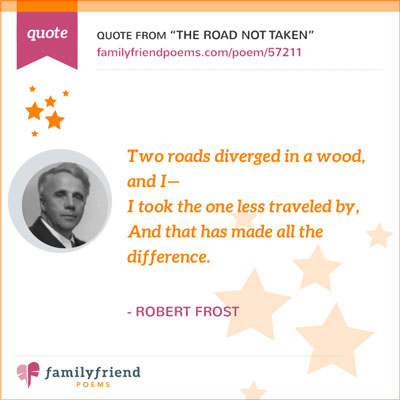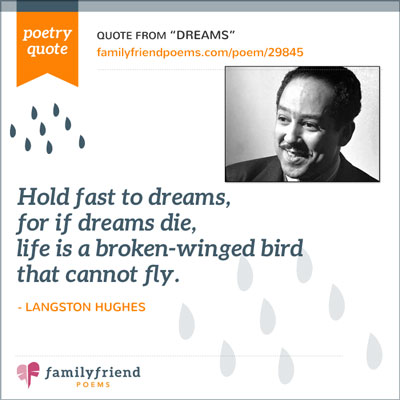Famous Inspirational Poems - Page 2
-
21. The Road Not Taken
Famous Poem
Two roads diverged in a yellow wood,
And sorry I could not travel both
And be one traveler, long I stood
And looked down one as far as I could
To where it bent in the undergrowth;
Then took the other, as just as fair,
And having perhaps the better claim
Because it was grassy and wanted wear,
Though as for that the passing there
Had worn them really about the same,
And both that morning equally lay
In leaves no step had trodden black.
Oh, I kept the first for another day!
Yet knowing how way leads on to way
I doubted if I should ever come back.
I shall be telling this with a sigh
Somewhere ages and ages hence:
Two roads diverged in a wood, and I,
I took the one less traveled by,
And that has made all the difference Featured Shared Story
Featured Shared StoryI think you are correct that the poem may be about a higher calling to pursue the best way. I also can agree as you stated he may have meant something else. Or he possibly did mean what you...
-
22. The Will To Win
Famous Poem
If you want a thing bad enough
To go out and fight for it,
Work day and night for it,
Give up your time and your peace and
your sleep for it
If only desire of it
Makes you quite mad enough
Never to tire of it,
Makes you hold all other things tawdry
and cheap for it
If life seems all empty and useless without it
And all that you scheme and you dream is about it,
If gladly you'll sweat for it,
Fret for it, Plan for it,
Lose all your terror of God or man for it,
If you'll simply go after that thing that you want.
With all your capacity,
Strength and sagacity,
Faith, hope and confidence, stern pertinacity,
If neither cold poverty, famished and gaunt,
Nor sickness nor pain
Of body or brain
Can turn you away from the thing that you want,
If dogged and grim you besiege and beset it,
You'll get it!Featured Shared StoryI like how I became motivated to proceed with caution concerning my worldly desire. I do not want my faith and hope to be misplaced. When my will is invoked by deep feelings of want for...
-
23. Dreams
Famous Poem
Hold fast to dreams
For if dreams die
Life is a broken-winged bird
That cannot fly.
Hold fast to dreams
For when dreams go
Life is a barren field
Frozen with snow. Featured Shared Story
Featured Shared StoryI so get it. Dreams are hope to a lot of us. I've heard it said that before you get it you have to dream it. I think when we stop dreaming we stop reaching, and when we stop reaching we stop...
-
24. The Paradoxical Commandments
Famous Poem
People are illogical, unreasonable, and self-centered.
Love them anyway.
If you do good, people will accuse you of selfish ulterior motives.
Do good anyway.
If you are successful, you will win false friends and true enemies.
Succeed anyway.
The good you do today will be forgotten tomorrow.
Do good anyway.
Honesty and frankness make you vulnerable.
Be honest and frank anyway.
The biggest men and women with the biggest ideas can be shot down by the smallest men and women with the smallest minds.
Think big anyway.
People favor underdogs but follow only top dogs.
Fight for a few underdogs anyway.
What you spend years building may be destroyed overnight.
Build anyway.
People really need help but may attack you if you do help them.
Help people anyway.
Give the world the best you have and you'll get kicked in the teeth.
Give the world the best you have anyway. Featured Shared Story
Featured Shared StoryThis poem is very touching. I think the poem is all about staying positive no what happens in life. People won't appreciate you for the your good deeds, but still have a positive attitude...
-
25. Be The Best Of Whatever You Are
Famous Poem
If you can't be a pine on the top of the hill,
Be a scrub in the valley — but be
The best little scrub by the side of the rill;
Be a bush if you can't be a tree.
If you can't be a bush be a bit of the grass,
And some highway happier make;
If you can't be a muskie then just be a bass —
But the liveliest bass in the lake!
We can't all be captains, we've got to be crew,
There's something for all of us here,
There's big work to do, and there's lesser to do,
And the task you must do is the near.
If you can't be a highway then just be a trail,
If you can't be the sun be a star;
It isn't by size that you win or you fail —
Be the best of whatever you are!Featured Shared StoryTwo years ago I was in depression and isolated. I felt frequently that I was worthless and deserved no love, no appreciation, no friends. I kept myself aloof from everyone, thinking that I...
-
26. How Did You Die?
Famous Poem
Did you tackle that trouble that came your way
With a resolute heart and cheerful?
Or hide your face from the light of day
With a craven soul and fearful?
Oh, a trouble's a ton, or a trouble's an ounce,
Or a trouble is what you make it,
And it isn't the fact that you're hurt that counts,
But only how did you take it?
You are beaten to earth? Well, well, what's that?
Come up with a smiling face.
It's nothing against you to fall down flat,
But to lie there -- that's disgrace.
The harder you're thrown, why the higher you bounce;
Be proud of your blackened eye!
It isn't the fact that you're licked that counts,
It's how did you fight -- and why?
And though you be done to the death, what then?
If you battled the best you could,
If you played your part in the world of men,
Why, the Critic will call it good.
Death comes with a crawl, or comes with a pounce,
And whether he's slow or spry,
It isn't the fact that you're dead that counts,
But only how did you die?Featured Shared StoryNo Stories yet, You can be the first!
-
27. In Spite Of War
Famous Poem
In spite of war, in spite of death,
In spite of all man's sufferings,
Something within me laughs and sings
And I must praise with all my breath.
In spite of war, in spite of hate
Lilacs are blooming at my gate,
Tulips are tripping down the path
In spite of war, in spite of wrath.
"Courage!" the morning-glory saith;
"Rejoice!" the daisy murmureth,
And just to live is so divine
When pansies lift their eyes to mine.
The clouds are romping with the sea,
And flashing waves call back to me
That naught is real but what is fair,
That everywhere and everywhere
A glory liveth through despair.
Though guns may roar and cannon boom,
Roses are born and gardens bloom;
My spirit still may light its flame
At that same torch whence poppies came.
Where morning's altar whitely burns
Lilies may lift their silver urns
In spite of war, in spite of shame.
And in my ear a whispering breath,
"Wake from the nightmare! Look and see
That life is naught but ecstasy
In spite of war, in spite of death!"Featured Shared StoryThis is some extraordinary literature I'm going to have to read to my grandchildren. Thank you for producing this beautiful work of art that I can share with the future generation.
-
28. Do Not Love Half Lovers
Famous Poem
Do not love half lovers
Do not entertain half friends
Do not indulge in works of the half talented
Do not live half a life and do not die a half death
If you choose silence, then be silent
When you speak, do so until you are finished
Do not silence yourself to say something
And do not speak to be silent
If you accept, then express it bluntly
Do not mask it
If you refuse then be clear about it
for an ambiguous refusal
is but a weak acceptance
Do not accept half a solution
Do not believe half truths
Do not dream half a dream
Do not fantasize about half hopes
Half a drink will not quench your thirst
Half a meal will not satiate your hunger
Half the way will get you no where
Half an idea will bear you no results
Your other half is not the one you love
It is you in another time yet in the same space
It is you when you are not
Half a life is a life you didn't live,
A word you have not said
A smile you postponed
A love you have not had
A friendship you did not know
To reach and not arrive
Work and not work
Attend only to be absent
What makes you a stranger to them closest to you
and they strangers to you
The half is a mere moment of inability
but you are able for you are not half a being
You are a whole that exists
to live a life not half a lifeFeatured Shared StoryNo Stories yet, You can be the first!
-
29. If I Can Stop One Heart From Breaking
Famous Poem
If I can stop one heart from breaking,
I shall not live in vain;
If I can ease one life the aching,
Or cool one pain,
Or help one fainting robin
Unto his nest again,
I shall not live in vain. Featured Shared Story
Featured Shared StoryThe poem transmits the meaning of helping from the heart, reaching out to those in need and soothing the pain felt by others. It doesn't need a hero to work wonders, only need a heart to...
-
30. Can't
Famous Poem
Can't is the worst word that's written or spoken;
Doing more harm here than slander and lies;
On it is many a strong spirit broken,
And with it many a good purpose dies.
It springs from the lips of the thoughtless each morning
And robs us of courage we need through the day:
It rings in our ears like a timely-sent warning
And laughs when we falter and fall by the way.
Can't is the father of feeble endeavor,
The parent of terror and half-hearted work;
It weakens the efforts of artisans clever,
And makes of the toiler an indolent shirk.
It poisons the soul of the man with a vision,
It stifles in infancy many a plan;
It greets honest toiling with open derision
And mocks at the hopes and the dreams of a man.
Can't is a word none should speak without blushing;
To utter it should be a symbol of shame;
Ambition and courage it daily is crushing;
It blights a man's purpose and shortens his aim.
Despise it with all of your hatred of error;
Refuse it the lodgment it seeks in your brain;
Arm against it as a creature of terror,
And all that you dream of you some day shall gain.
Can't is the word that is foe to ambition,
An enemy ambushed to shatter your will;
Its prey is forever the man with a mission
And bows but to courage and patience and skill.
Hate it, with hatred that's deep and undying,
For once it is welcomed 'twill break any man;
Whatever the goal you are seeking, keep trying
And answer this demon by saying: "I can."Featured Shared StoryNo Stories yet, You can be the first!
-
31. Love After Love
Famous Poem
The time will come
when, with elation,
you will greet yourself arriving
at your own door, in your own mirror,
and each will smile at the other's welcome,
And say, sit here. Eat.
You will love again the stranger who was yourself.
Give wine. Give bread. Give back your heart
to itself, to the stranger who has loved you
all your life, whom you ignored
for another, who knows you by heart.
Take down the love letters from the bookshelf,
the photographs, the desperate notes,
peel your own image from the mirror.
Sit. Feast on your life.Featured Shared StoryMy husband died 10 years ago. He was the love of my life, my soul-mate, my best friend. I have not known how to 'adjust' to him being gone until I read this poem, "Love After Love." Everyone...
-
32. As You Go Through Life
Famous Poem
Don't look for the flaws as you go through life;
And even when you find them,
It is wise and kind to be somewhat blind
And look for the virtue behind them.
For the cloudiest night has a hint of light
Somewhere in its shadows hiding;
It is better by far to hunt for a star,
Than the spots on the sun abiding.
The current of life runs ever away
To the bosom of God's great ocean.
Don't set your force 'gainst the river's course
And think to alter its motion.
Don't waste a curse on the universe--
Remember it lived before you.
Don't butt at the storm with your puny form,
But bend and let it go o'er you.
The world will never adjust itself
To suit your whims to the letter.
Some things must go wrong your whole life long,
And the sooner you know it the better.
It is folly to fight with the Infinite,
And go under at last in the wrestle;
The wiser man shapes into God's plan
As water shapes into a vessel.Featured Shared StorySometimes life goes up and down between hills and rivers, but with even the least courage and a sign of faith in the turn we make at the sharp curve, it all levels up to positivity no matter...
-
33. Still Here
Famous Poem
I been scarred and battered.
My hopes the wind done scattered.
Snow has friz me,
Sun has baked me,
Looks like between 'em they done
Tried to make me
Stop laughin', stop lovin', stop livin'--
But I don't care!
I'm still here!Featured Shared StoryThis poem was in a textbook of mine from the sixth grade. As a child, it resonated with me. It inspired me to write poetry. As a child, educated by white folk, I had no idea who Langston...
-
34. Your World
Famous Poem
Your world is as big as you make it.
I know, for I used to abide
In the narrowest nest in a corner,
My wings pressing close to my side.
But I sighted the distant horizon
Where the skyline encircled the sea
And I throbbed with a burning desire
To travel this immensity.
I battered the cordons around me
And cradled my wings on the breeze,
Then soared to the uttermost reaches
With rapture, with power, with ease!Featured Shared StoryNo Stories yet, You can be the first!
-
35. Caged Bird
Famous Poem
Analysis of Form and Technique
The free bird leaps
on the back of the wind
and floats downstream
till the current ends
and dips his wings
in the orange sun rays
and dares to claim the sky.
But a bird that stalks
down his narrow cage
can seldom see through
his bars of rage
his wings are clipped and
his feet are tied
so he opens his throat to sing.
The caged bird sings
with fearful trill
of the things unknown
but longed for still
and his tune is heard
on the distant hill for the caged bird
sings of freedom
The free bird thinks of another breeze
and the trade winds soft through the sighing trees
and the fat worms waiting on a dawn-bright lawn
and he names the sky his own.
But a caged bird stands on the grave of dreams
his shadow shouts on a nightmare scream
his wings are clipped and his feet are tied
so he opens his throat to sing
The caged bird sings
with a fearful trill
of things unknown
but longed for still
and his tune is heard
on the distant hill
for the caged bird
sings of freedom.Featured Shared StoryI remember this poem from my guided reading class in 5th grade. I remember it well. This poem really touched me, and reading it again just made my day. This poem, I remember it being about...
-
36. Hope Is The Thing With Feathers
Famous Poem
"Hope" is the thing with feathers -
That perches in the soul -
And sings the tune without the words -
And never stops - at all -
And sweetest - in the Gale - is heard -
And sore must be the storm -
That could abash the little Bird
That kept so many warm -
I've heard it in the chillest land -
And on the strangest Sea -
Yet - never - in Extremity,
It asked a crumb - of me.Featured Shared StoryI recited this poem in grade six and it has been an inspiration for me ever since. Wonderful work!
-
37. Barter
Famous Poem
Life has loveliness to sell,
All beautiful and splendid things,
Blue waves whitened on a cliff,
Soaring fire that sways and sings,
And children's faces looking up
Holding wonder like a cup.
Life has loveliness to sell,
Music like a curve of gold,
Scent of pine trees in the rain,
Eyes that love you, arms that hold,
And for your spirit's still delight,
Holy thoughts that star the night.
Spend all you have for loveliness,
Buy it and never count the cost;
For one white singing hour of peace
Count many a year of strife well lost,
And for a breath of ecstasy
Give all you have been, or could be.Featured Shared StoryHow wonderful to stop, really see, and appreciate what nature gives us. I too love the crashing waves, the dancing flames and beautiful smells around us, we need to be mindful of every moment...
-
38. Fear
Famous Poem
It is said that before entering the sea
a river trembles with fear.
She looks back at the path she has traveled,
from the peaks of the mountains,
the long winding road crossing forests and villages.
And in front of her,
she sees an ocean so vast,
that to enter
there seems nothing more than to disappear forever.
But there is no other way.
The river can not go back.
Nobody can go back.
To go back is impossible in existence.
The river needs to take the risk
of entering the ocean
because only then will fear disappear,
because that’s where the river will know
it’s not about disappearing into the ocean,
but of becoming the ocean.Featured Shared StoryNo Stories yet, You can be the first!
-
39. It Might Have Been
Famous Poem
We will be what we could be. Do not say,
"It might have been, had not or that, or this."
No fate can keep us from the chosen way;
He only might who is.
We will do what we could do. Do not dream
Chance leaves a hero, all uncrowned to grieve.
I hold, all men are greatly what they seem;
He does who could achieve.
We will climb where we could climb. Tell me not
Of adverse storms that kept thee from the height.
What eagle ever missed the peak he sought?
He always climbs who might.
I do not like the phrase, "It might have been!"
It lacks all force, and life's best truths perverts:
For I believe we have, and reach, and win,
Whatever our deserts.Featured Shared StoryNo Stories yet, You can be the first!
-
40. The Laughing Heart
Famous Poem
Your life is your life
Don’t let it be clubbed into dank submission.
Be on the watch.
There are ways out.
There is a light somewhere.
It may not be much light but
It beats the darkness.
Be on the watch.
The gods will offer you chances.
Know them.
Take them.
You can’t beat death but
You can beat death in life, sometimes.
And the more often you learn to do it,
The more light there will be.
Your life is your life.
Know it while you have it.
You are marvelous
The gods wait to delight
In you.Featured Shared StoryNo Stories yet, You can be the first!
Advertisement
Advertisement
Advertisement
Advertisement


 Hope Poems
Hope Poems Inspirational Poems
Inspirational Poems Courage Poems
Courage Poems Meaningful Poems
Meaningful Poems Graduation Poems
Graduation Poems Famous Family Poems
Famous Family Poems